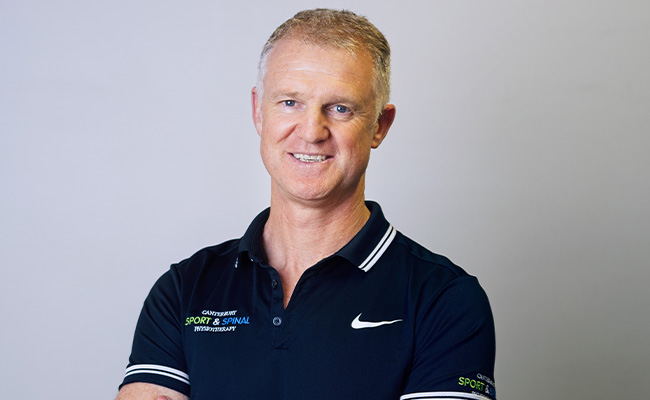
Antony Bush
Concerned at mixed messages for chronic back pain sufferers, Otago alumnus Antony Bush decided to write a self-help back pain guide.
Antony says there’s always a lag between the completion of research and it being applied in the real world. Research published in 2012 from fellow Otago alumnus Professor Peter O’Sullivan at Australia’s Curtin University highlighted the need for a major change in the treatment of chronic back pain.
Drawing from this and his own 30 years of expertise in spinal pain and working with elite athletes, Antony shares the top 10 ‘back facts’ in his book The Back Fix, which was recently published.
“It’s done really well (the book launch). There are many people with chronic back pain who really need help,” he says.
Back pain is currently the biggest disability in the world. It’s a multi-billion-dollar health issue.
“There’s no quick fix for back pain, the joints need well-paced movement. It’s okay to load your back.”
Antony says, “the best posture is the next posture, movement is medicine. Whether a highly trained athlete, a sedentary office worker, or a manual labourer, the answer lies in finding your inner ape.
“In this industrialised age, we are no longer active hunter-gatherers. We no longer roam and with that we’ve lost something vitally important; we’ve lost our predisposition to move.”
In an increasingly sedentary world Antony says those with back pain need to be the main protagonists in the story of their recovery.
From a family of Canterbury physios, he initially trained at Otago Polytechnic before studying at the University of Otago.
“I absolutely loved Otago. One of the key backers for my book was fellow Otago alumnus and Spinal Orthopaedic Surgeon Dr Kristian (Kris) Dalzell.”
Antony and Kris completed their physiotherapy training together at Otago in the 90s. Kris went on to complete his medical training at Otago and is now a spinal and orthopaedic surgeon based in Christchurch.
“If you do less than 90 minutes a week of exercise and sit for more than six hours a day, you’re likely to experience back pain. At the other end of the spectrum, if you do more than 90 minutes of high intensity exercise a day you are likely to experience back pain. The research shows there’s a sweet spot of 150-300 minutes of moderate exercise a week, which includes two strengthening sessions.
“If we’re tired, stressed, fatigued, run down and not moving much we will get back pain as a symptom of that lifestyle,” he says.

Otago alumni Dr Kris Dalzell and Antony Bush at launch of The Back Fix
Ninety to 95 per cent of us have non-specific lower back pain, which is not ‘pathology’ related. And early MRIs don’t help. In one study, two groups were given an MRI. The first group were told that the various changes seen were normal and age-related, like ‘wrinkles’, whilst the other group were simply given the images without that reassurance. The latter group experienced significantly greater pain, mental and physical distress, and loss of self-efficacy than the first.
“So, our understanding and outlook of our prognosis greatly affects our outcome.”
The Back Fix is a research-updated version of a famous book by fellow Kiwi, Otago alumnus Robin McKenzie Treat your own back. Published in 1980, it sold four million copies world-wide. Robin graduated from the University of Otago in 1952 and became a world leader in the treatment of spinal conditions, developing the McKenzie Method. He died on the Kapiti Coast in 2013.
After completing a Postgraduate Diploma in Exercise Physiology at Otago in 1993, Antony worked for 10 years in Queenstown, primarily in the ski industry, where he worked as a New Zealand Winter Olympic team physiotherapist.
He then went to Sydney and worked for several years at the Sydney Academy of Sport alongside the Wallabies, Diamonds (netball), and rugby sevens team physiotherapists.
In 2017 he set up his business Canterbury Sport & Spinal Physiotherapy in Christchurch, where he is currently based.
The Back Fix is available in New Zealand bookstores. For eBook versions, or to contact the author go to www.thebackfix.com or Back Fix here